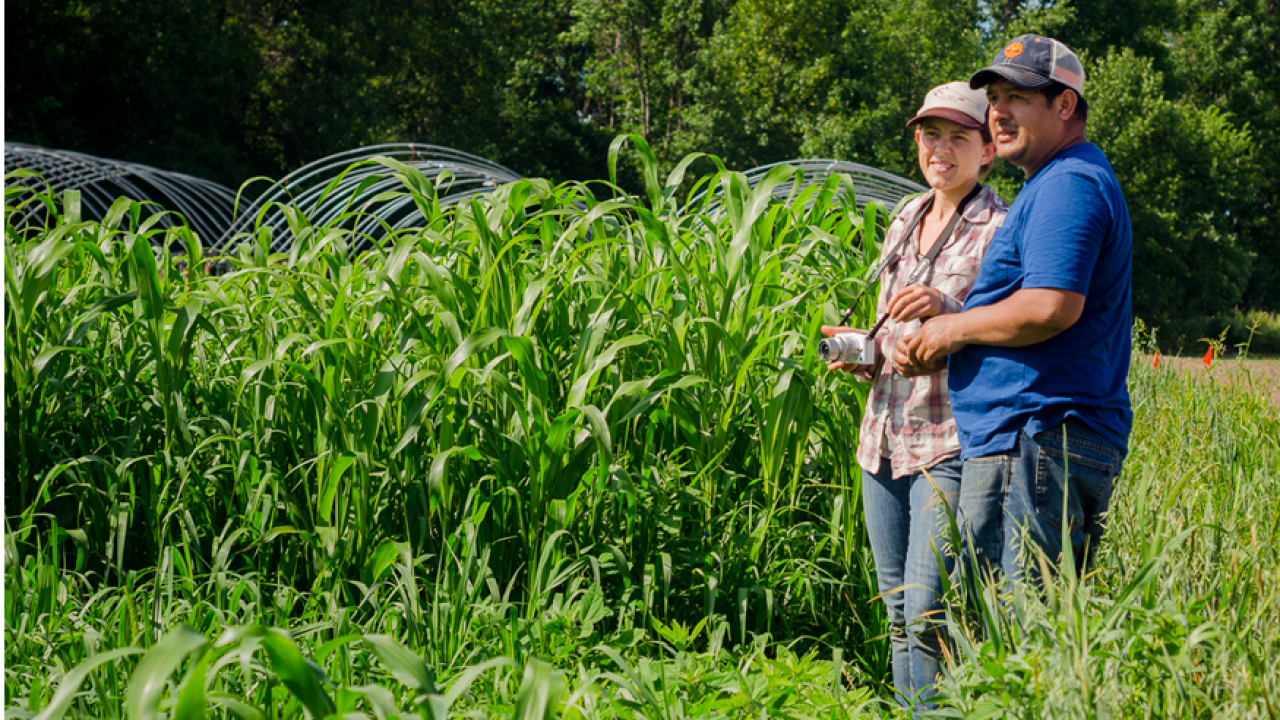
#6 Ground truth: reflecting on the importance of learning from farmers
Blog Post by Vivian Wauters, Post Doctoral Fellow
December 2020
The morning of my dissertation defense, which focused on integrating summer cover crops into vegetable systems, a former farming mentor mentioned to me that he was planting cover crops that same day. This felt like a cosmic gift of perspective at the final test of my academic work in graduate school. It was a reminder of how important it is to cultivate habits as a researcher that keep me in contact with growers so that my work is informed by and dependent on their practical wisdom.
I started graduate school a week after leaving my position as the manager of a small-scale vegetable farm in the fall of 2016. My research interests were to combine academic and farmer ways of knowing to advance our joint understanding of practices that could make farming a more ecologically sustainable practice. Fortunately, I was able to be a part of a collaborative project in which I worked closely with a vegetable grower named Rodrigo, who was interested in using cover crops between spring and fall vegetable production. Together with Rodrigo and another grower, Sarah, we designed and set up on-farm trials for two growing seasons. I took responsibility for most of the data collection and analysis, while they took the lead on field management, and running the rest of their farm operations. I made it a priority to work on the farms whenever I visited to conduct research activities, by helping weed fields, transplant seedlings, harvest crops, or anything else that was needed that day. In turn, the farmers took time out of their operations to co-host field days with me and answer questions.
Working with farmers on their farms was a crucial part of my learning in graduate school. During one of my early visits to Rodrigo’s farm, after checking on my new established cover crop plots, I stayed for a few hours to help weed spring broccoli. While we worked, Rodrigo mentioned some of his personal history of discomfort working with state and federal farming agencies. As a Latino immigrant farmer, his experience with farm loans, grant applications, and county conservation offices differed widely from the experiences I had heard about from other white, US citizen farmers. Further conversations with him and other immigrant growers who were all part of a farming cooperative helped me to better understand the history of discrimination and continuing disconnect with the USDA. Through these conversations, Rodrgio helped me develop a qualitative research component in my dissertation, in which I interviewed farmers and other food systems professionals about the necessary factors for successful collaboration. We found that trust, self-learning, and institutional support are critical to foster authentic and successful collaborations with the group immigrant growers I was working with. Working with these growers made it clear to me the necessity of reaching out beyond the farmers whose life experience was relatively similar to my own.
During my graduate research I was also fortunate to present a soil health workshop for indigenous growers at the Red Lake Nation Food Summit. Through participation in the Summit I connected with farmers from the Red Lake and White Earth Nations and we worked together for them to use cover crops to help some of the degraded soils they recently regained stewardship over. The growers I was fortunate enough to work with demonstrated the possibility and importance of questioning my colonial academic reductionist training and of learning about indigenous ways of knowing. For these growers, cover crops and soil health go far beyond improvement management practices because they are part of reclaiming food sovereignty, living in relationship with the rest of the world, and healing the Earth through agriculture.
I also made a practice to show up to farmer-focused trainings, workshops, and conferences where I could be in direct conversation with farmers. While attending a Farming While Queer session at a local farming conference, I began to understand the libertatory potential of rethinking of farms beyond the traditional nuclear family model, such that growers can build farms as part of cooperatives based on healthy working relationships instead of as businesses linked by blood or a marriage contract.
As a new postdoc in the Gaudin Lab, my current work also involves farmer consultation on the topic of cover cropping in almond orchards, and I’m grateful for opportunities to continue to reach out and learn from farmers directly. Some promising ways that I and other members of the lab have done this learning is through volunteering on farms, seeking farmers out for conversations at local farmers markets, and engaging with them on social media. During the pandemic, social media is a great way to learn from growers through pictures and writing. Some recent impactful things I’ve seen include collective ways to think about farming operations, efforts to rematriate seeds, and the incredible precision with which farmer workers harvest many common fruits and vegetables.
There are lots of farmers who can, and are, figuring out the present and future of agriculture. I’m grateful for the opportunities that we as researchers have to uplift them; to recognize that it’s often farmers, and especially those who’ve been historically marginalized by the agricultural mainstream, who are at the vanguard of changing their systems for the better, and who have the solutions that we should be supporting through collaborative research.
